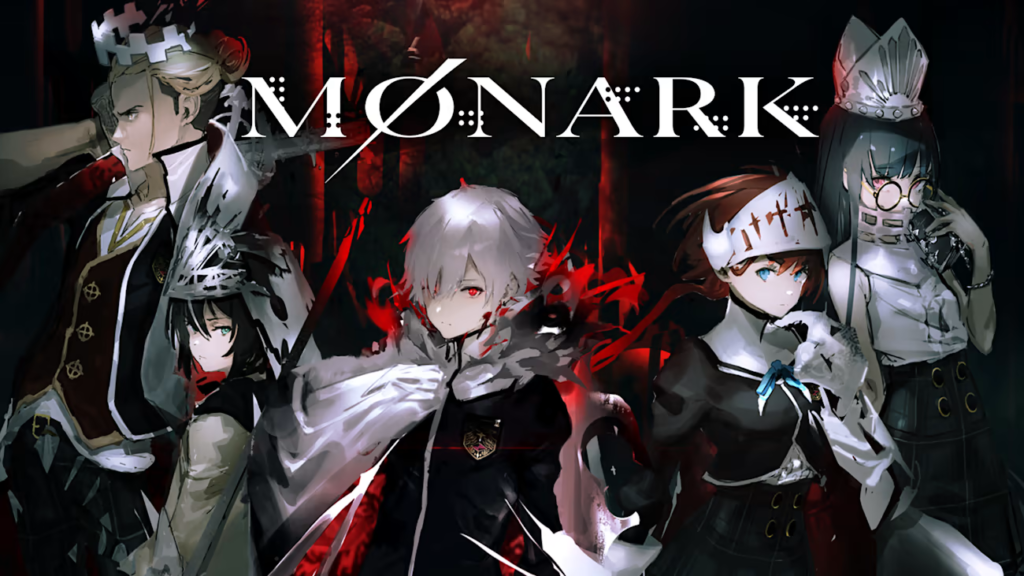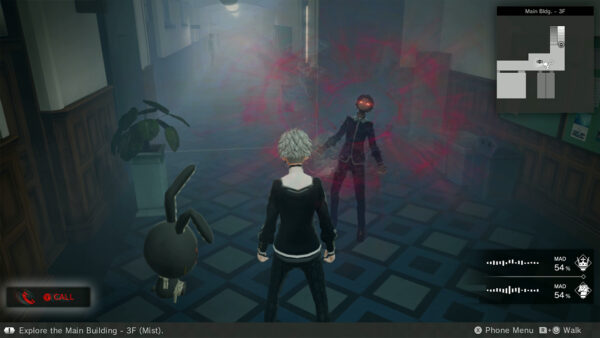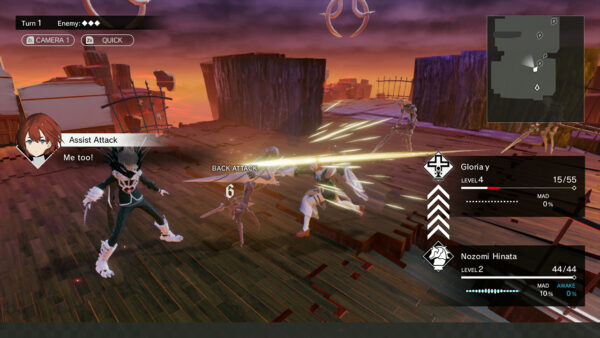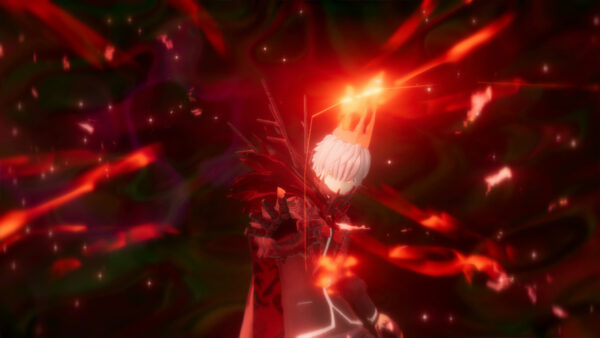
The Shin Megami Tensei series is beloved by fans around the world. When a new title was announced by former developers from the Shin Megami Tensei and spin-off Persona series, many gamers were overjoyed. A new game with that classic SMT feel? Sign us up!
Monark, the new JRPG from FuRyu and publisher NIS America, takes place in a school known as Shin Mikado Academy that has been cut off by a mysterious mist which is slowly driving the students insane. Your job, along with your allies, is to solve the problem and save the school! This might not be as easy as it seems though, since the mist is the byproduct of demonic entities known as Monarks making pacts with humans.
So how can you possibly stop the demonic Monarks? You fight back by making pacts yourself in order to gain new abilities and summons. Pacts are based on emotions and concepts such as the seven deadly sins and their counterparts (vanity, hope, etc) that give specific abilities to the characters. For example, sloth summons will have high evasion rates, because sloth wants to avoid doing much work. In other words, sloth summons hit hard to avoid needing to do more and avoid damage so as to not need to spend time healing.
Where the story in Monark shines is the creepy atmosphere, as you try and uncover more of the mystery of the Otherworld. You must also deal with other students who are being affected in various ways, such as cult-like worship of the student council president, students talking to lockers and thinking they are people, and the interesting madness gauge that fills up as you explore the mist and has negative effects culminating in a game over when it fills up. Where it falls flat however is the actual writing and dialogue, which comes off as a bit formulaic and even cheesy at times, ruining the setting. It’s unfortunate because Monark has some great concepts incorporated into the storytelling with the integration of the seven deadly sins and other clever ideas. Characters are sadly two-dimensional, the main character starts with classic JRPG amnesia, and the entire setup for the storyline fails to be engaging right from the start. The atmosphere and ambience manages to be decent but the overall depth of the storyline is sorely lacking.

Gameplay takes place in two locations, an overworld consisting of the mist-laden academy, and the Otherworld where battles happen and demons reside. The Otherworld is the world the demons come from, and is the source of the unnatural events happening due to the pactbearers causing it to bleed into the real world. A Monark called Vanitas explains the situation and gives the protagonist his powers, but this feels like an attempt to replicate character dynamics from the Persona series while failing to emulate its heart. You are pulled into the Otherworld through phone calls and must fight in battles in the form of tactical strategy battles similar to The Caligua Effect (review here). But before that even happens, the game drags its feet a bit, and this constant interruption of gameplay becomes a constant issue. Gameplay takes a long time to actually get moving with any consistency and the battles are very limited at the start, making the entire introduction a tedious slog to complete.
The strategic battles feel clunky at times, though managing summons is easy enough. The whole combat system is wildly over-complicated with more options than are really needed and can be more than a bit overwhelming. It’s almost as if FuRyu took every concept from every JRPG that they thought was cool and tried to shoehorn them all into one UI that crushes you beneath the weight of its options. A wrong move early in a fight may not be apparent right away but due to the complexity of the system, can weaken you fatally when it is too late to adjust your approach
Battles take place with the main characters, an ally, and an ever-growing number of summoned constructs who attack on your behalf. While turn-based, combat utilizes a free movement system which allows you to move and attack within a circle that surrounds the characters. This sounds neat at first but it doesn’t work as well as it should. As you issue actions and commands, it becomes increasingly clear that the management system is more than a bit cumbersome. In combat, you use Arts and Authorities which are separate abilities each having their own strengths and weaknesses. While in combat, it’s essential to always consider both to succeed as survival depends on balancing Art against Authority. For instance, using an Art burns health while an Authority will significantly raise the madness gauge. The resource management becomes even more complex when you consider that the madness gauge can actually make the player’s authorities become more powerful as it increases. Do you drive your self mad for power? Or shed health in an attempt to stay sane while you fight back against the Monarks?

Using too much Authority can cripple you and ruin battles. Unless another unit is powered up and can help “enlighten” the maddened unit, the unit will attack friends and foes alike indiscriminately, ruining a well thought out plan and losing combat quickly. Overall, it’s this blending of elements from turn-based RPGs with the SRPG genre that ends up creating an unsatisfying feel to the combat in Monark. While there is a certainly a lot of potential for strategic combat if you learn the subtle nuances of the system, the game seems to emphasize high risk/high reward gameplay a bit too much and comes off feeling broken.
The individual pacts and abilities you acquire can all level up, opening up more options (and adding even more complexity). By the time that happens however, chances are high that you’ll be bored of the game, especially with the plodding pace of the storyline and the constant drudge of menu management. Part of the reason for that is that the developers tried to incorporate concepts from different genres into a very specific style of game and they simply do not integrate well. These include the constant rise of the madness gauge during exploration, which feels like an attempt to add a twist on dungeon crawling gameplay. With the SRPG structure of Monark, this simply doesn’t work well and interferes with your ability to explore, making the game even more tedious. The narrative in the game feels more suited to a traditional JRPG and it’s true that the battle mechanics would make for a great turn-based RPG in the vein of Persona or the Shin Megami Tensei series. But with the way the SRPG and JPRG elements interact, the end result is that Monark feels like more an SRPG desperately trying to pass itself off as a turn-based JRPG and failing miserably at both.
The visuals in Monark are well-designed and help sell the creepy atmosphere the game tries to provide but still feel a bit weaker than they should. There’s a bit of Shin Megami Tensei in the lines of the art and a few other things as well. The visuals are often very dismal and bland, but the detail level is decent, even if it Monark doesn’t feel like a AAA title. The generic JRPG style has hints of a plethora of other styles contained within though and it will at least scratch that dark, mature itch, even if the visuals never reach the heights of a top tier game like Persona 5. The game’s music is decent as well, mirroring the creepy vibe and misty mystery of the game. However, it is noticeably minimalistic compared to other strategy RPGs, and to be honest, there is a lot of unfulfilled potential in the soundtrack even if it is serviceable.

So, is Monark just a wash? Should you even bother? Well, the story does manage some great moments on occasion when you finally get to them and there is a genuine atmosphere of horror that surpasses even some of the later Shin Megami Tensei games. It’s also a definite benefit that Monark cribs heavily from the original Shin Megami Tensei If storyline. They do say that imitation is the sincerest form of flattery after all. Unfortunately, the gameplay from SMT If, which has definitely not aged well, was also emulated a bit too closely. Sometimes, the past simply cannot be recaptured, and so while the game has moments of brilliance, the overall product consistently falls short, leaving you wanting a more polished product with a higher fun factor and better engagement. It should be noted that with that dark atmosphere also come some rather graphic bits of plot, and some of the narrative elements may be a bit much for some players. Be warned that if themes like suicide are a trigger issue, then Monark is likely not the game for you. Many of these story elements are told by having the player just stumble across small events, and these instances can be disturbing and amazing at different times by letting the player find them on their own.
Monark has significant potential conceptually but is held back by a cumbersome combat system, a story that only occasionally teases the greatness it could achieve, and music and visuals that feel flat and dull. There are just too many flaws and inconsistencies here to really enjoy the game. Making an SMT tribute with its own flavor was theoretically a good idea, but realistically, FuRyu should have probably taken a step back and evaluated the fun factor of the gameplay and the pacing of the plot here. If you’re a hardcore JRPG fan and you don’t mind interminable menus and a slow, plodding storyline that only occasionally sparks your interest, you might want to check Monark out anyway. But for most of you, you’ll probably be thankful you passed.
Monark was reviewed on Nintendo Switch and is available also on PS4, PS5, and PC.
Disclaimer: A review key was provided
Images were taken from Nintendo.co.uk

